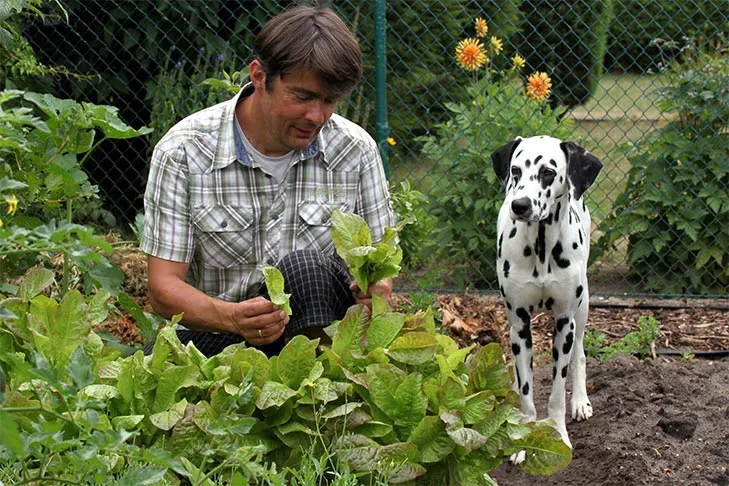As devoted pet parents, it’s natural to want to share everything with our beloved canine companions, including our favorite snacks. However, the delightful treat that’s safe for humans might pose serious health risks for dogs. Understanding the unique way dogs digest food is crucial, as offering the wrong fruits or vegetables can lead to long-term health issues, and in severe cases, even be fatal. While dogs, being omnivores, don’t strictly require fruits and vegetables in their diet, offering dog-safe varieties in moderation can be a healthy and enjoyable treat. This guide will focus on identifying What Fruits Not To Give Dogs, alongside outlining safe options and important precautions to ensure your furry friend’s well-being. Before introducing any new foods, especially if your dog has dietary sensitivities, always consult with your veterinarian. Knowing what yorkies can and cannot eat is especially important for smaller breeds with sensitive stomachs.
Safe Fruits for Dogs: A Healthy Treat in Moderation
Many fruits can serve as delicious and nutritious treats for dogs when given in moderation, offering a valuable source of essential vitamins, minerals, and antioxidants. These natural snacks can supplement your dog’s diet and provide enjoyable enrichment. Remember to always prepare fruits properly by removing seeds, pits, and rinds, and cut them into appropriate, bite-sized pieces to prevent choking hazards.
Apples
Apples are an excellent source of vitamins A and C, along with beneficial fiber, making them a great snack for your dog. They are also low in protein and fat, which is particularly advantageous for senior dogs or those managing their weight. Always ensure you remove the seeds and core, as apple seeds contain small amounts of cyanide. For a refreshing warm-weather treat, consider freezing apple slices.
Bananas
Bananas, in small quantities, are a fantastic low-calorie treat packed with potassium, various vitamins, biotin, fiber, and copper. They are also low in cholesterol and sodium. Due to their high sugar content, bananas should only be given as an occasional treat and not form a significant part of your dog’s regular diet. You can find ready-made banana dog treats as a convenient option.
Blueberries
Often considered a superfood, blueberries are rich in antioxidants that help protect cells from damage in both humans and canines. They also provide a good source of fiber and phytochemicals. Blueberries are an excellent choice for training treats due to their size and health benefits. Many commercial dog treats incorporate blueberries for their powerful nutritional profile.
Cantaloupe
This nutrient-dense melon is low in calories and a good source of water and fiber, aiding in hydration and digestion. However, cantaloupe is high in sugar, so it should be given sparingly, especially to dogs who are overweight or have diabetes. Freezing small cubes or balls of cantaloupe can create a delightful and hydrating snack for your dog during warmer months.
Cranberries
Both fresh and dried cranberries are safe for dogs to eat in small amounts, although some dogs might not appreciate their tart taste. Moderation is key, as excessive consumption can lead to an upset stomach. It’s important to note that many dried cranberries for human consumption are sweetened, adding unnecessary sugar to your dog’s diet. Opt for unsweetened fresh or frozen cranberries, or specialized cranberry dog treats.
Cucumbers
Cucumbers are particularly beneficial for overweight dogs due to their very low carbohydrate and fat content, along with high water content that promotes satiety. They are loaded with vitamins K, C, and B1, as well as potassium, copper, magnesium, and biotin. Cool cucumber slices make an excellent refreshing treat on hot days; you can even freeze them for an extra fun snack.
 Russell Terrier funny portrait with cucumber slices.
Russell Terrier funny portrait with cucumber slices.
Mango
This sweet and juicy tropical fruit is a powerhouse of vitamins A, B6, C, and E, along with potassium, beta-carotene, and alpha-carotene. As with most fruits with a large pit, always remove the hard pit first, as it contains small amounts of cyanide and poses a significant choking hazard. Mango is high in sugar, so offer it as an occasional treat, particularly for dogs prone to weight gain.
Oranges
Veterinarians confirm that oranges are fine for dogs to eat, although their strong citrus smell and taste may not appeal to all canines. Oranges are an excellent source of vitamin C, potassium, and fiber. The juicy flesh, given in small quantities, can be a tasty and beneficial treat. Vets recommend removing the orange peel and any seeds, as the peel can be tough on their digestive systems, and the oils might deter sensitive noses.
Peaches
Small quantities of fresh or frozen peaches, cut into pieces, are a good source of fiber and vitamin A. However, like cherries, the pit contains cyanide and must be completely removed and safely discarded in a dog-proof trash receptacle. Avoid canned peaches, which typically contain high amounts of sugary syrups that are unhealthy for dogs, even those labeled “in natural juice.”
Pears
Pears are a healthy snack for dogs, rich in copper, vitamins C and K, and fiber. When sharing pears with your dog, it’s crucial to cut the flesh into bite-sized chunks and remove the core and seeds, as pear seeds also contain traces of cyanide. As with peaches, steer clear of canned or jarred pears that come with sugary syrups.
Pineapple
A few chunks of fresh pineapple can be a delightful sweet treat for dogs, provided the prickly outer peel and crown are thoroughly removed. This tropical fruit is packed with vitamins, minerals, and fiber. It also contains bromelain, an enzyme that can aid dogs in absorbing proteins. Avoid canned or packaged pineapple in sweetened syrups to prevent unnecessary sugar intake, especially for dogs susceptible to obesity.
Pumpkin
Pure pumpkin is a highly beneficial food for dogs, particularly known for its ability to relieve both diarrhea and constipation. It’s also rich in antioxidants. When purchasing canned pumpkin, always choose 100% pumpkin puree, not pumpkin pie filling which contains added sugars and spices. You can also roast fresh pumpkin and feed the peeled flesh to your dog. Many pumpkin supplements and treats are available for added convenience.
Raspberries
Raspberries are safe for dogs in moderation and are lauded for their antioxidant properties. They are low in sugar and calories but high in fiber, manganese, and vitamin C. Raspberries are especially beneficial for senior dogs due to their anti-inflammatory properties, which can help support aging joints. Because raspberries contain small, naturally occurring amounts of xylitol, limit your dog to no more than 8 ounces of fresh or frozen raspberries.
Strawberries
Strawberries are full of fiber and vitamin C, and they contain an enzyme that can help naturally whiten your dog’s teeth. Like all fruits, strawberries contain natural sugar, so they should be offered in moderation. Frozen strawberries can be a fun and engaging enrichment treat.
 Pembroke Welsh Corgi sniffing at a strawberry on a blue background.
Pembroke Welsh Corgi sniffing at a strawberry on a blue background.
Watermelon
Dogs can enjoy watermelon, but it is imperative to remove all seeds and the rind beforehand, as they can cause intestinal blockages. The flesh of the watermelon is safe and packed with vitamins A, B-6, and C, as well as potassium. Comprising 92% water, watermelon is an excellent way to keep your dog hydrated, especially during hot summer days. Freezing chunks of seeded watermelon makes for a refreshing and engaging treat.
This comprehensive list helps pet owners discern which fruity treats are beneficial. For more insights on canine nutrition, especially for discerning eaters, you might find information on what can i give my picky dog to eat particularly useful.
Fruits Dogs Should Absolutely Avoid
While certain fruits offer fantastic health benefits, many contain compounds, seeds, or pits that are dangerous, if not outright toxic, to dogs. It is paramount to keep these fruits completely out of your dog’s reach to safeguard their health and prevent potential emergencies. When considering human foods, understanding what human food can yorkies eat also includes what they absolutely cannot.
Avocado
Despite being a superfood for humans, avocado should not be given to dogs. The pit, skin, and leaves of avocados contain persin, a toxin that frequently causes vomiting and diarrhea in dogs. While the fleshy inside of the avocado fruit contains less persin, it can still be enough to cause gastrointestinal upset. Furthermore, avocado flesh is high in fat, which can lead to digestive problems or contribute to serious conditions like pancreatitis if consumed in large quantities.
Cherries
With the sole exception of the fleshy fruit around the seed, all parts of cherry plants contain cyanide and are highly toxic to dogs. Cyanide interferes with cellular oxygen transport, depriving your dog’s blood cells of adequate oxygen. If you have a cherry tree in your yard, ensure your dog cannot access fallen fruit. Symptoms of cyanide poisoning, such as dilated pupils, difficulty breathing, and red gums, require immediate veterinary attention. Always secure discarded cherry pits in a dog-proof trash can.
Grapes
Grapes and raisins are exceptionally toxic to dogs, regardless of their breed, age, or sex. Even small amounts can lead to acute kidney failure. If you suspect your dog has ingested grapes or raisins, contact your veterinarian immediately. It’s crucial to be vigilant about this dangerous fruit, especially if children in your home consume them. Never place grapes or raisins in a compost heap accessible to your dog.
Tomatoes
While the ripened red flesh of a tomato fruit is generally considered safe for dogs, the green parts of the tomato plant—including the leaves, stems, and unripe fruit—contain a toxic substance called solanine. A dog would typically need to consume a large quantity of the plant material to become severely ill. However, to err on the side of caution, it’s generally best to avoid feeding tomatoes altogether and prevent your dog from accessing tomato plants in your garden.
Safe Vegetables for Dogs: Nutritional Boosts
Just like fruits, many vegetables can be a healthy and nutritious addition to your dog’s diet when offered appropriately and in moderation. These vegetables provide essential vitamins, minerals, and fiber, contributing to overall canine health. Always wash vegetables thoroughly and cut them into suitable sizes to prevent choking.
Broccoli
Broccoli is safe for dogs to eat in small quantities and should be given as an occasional treat. It is high in fiber and vitamin C and low in fat. However, the florets contain isothiocyanates, which can cause mild to potentially severe gastric irritation in some dogs. Tough broccoli stalks have also been known to cause esophageal obstructions. If your dog enjoys broccoli, serving it cooked can help mitigate these issues.
Brussels Sprouts
Brussels sprouts are packed with beneficial nutrients and antioxidants for both humans and dogs. However, moderation is crucial when feeding them to your dog, as consuming too many can lead to significant gas and digestive discomfort. If your dog is a fan, consider supplementing with dehydrated dog foods that include these leafy greens as an ingredient.
Carrots
Carrots are an excellent, low-calorie snack, rich in fiber and beta-carotene, which the body converts into vitamin A. Additionally, the crunchy texture of carrots can help clean your dog’s teeth. Carrots are a common ingredient in many dog foods and a popular choice for dog treats due to their nutritional value and dental benefits.
Celery
Beyond providing vitamins A, B, and C, celery contains nutrients known to support heart health and potentially help in fighting cancer. An added bonus is that celery is also recognized for its ability to help freshen doggy breath. You can often find celery dog chews as a convenient option for your dog to enjoy.
Green Beans
Green beans—whether chopped, steamed, raw, or canned—are safe for dogs to eat, provided they are plain and unsalted. They are abundant in important vitamins and minerals, fiber, and are low in calories. When using canned green beans, always opt for a no-salt-added variety. Frozen green beans can also serve as a fun and cooling enrichment snack.
Peas
Green peas, snow peas, sugar snap peas, and garden or English peas are all acceptable for dogs to consume occasionally. Peas offer several vitamins, minerals, and are rich in protein and high in fiber. You can feed your dog fresh or frozen peas, but always avoid canned peas that contain added sodium.
Spinach
Dogs can eat spinach, but it’s not the top recommendation among vegetables to share. Spinach is high in oxalic acid, which can hinder the body’s ability to absorb calcium and potentially lead to kidney damage if consumed in very large quantities over time. While a dog would likely need to eat a significant amount for this to be a concern, it might be safer to choose other vegetables. If you wish for your dog to benefit from this leafy green, spinach-inclusive dog treats are available for occasional snacking.
 Dalmatian watching a man gardening and picking leaves.
Dalmatian watching a man gardening and picking leaves.
Vegetables Dogs Must Steer Clear Of
Just as with fruits, while many vegetables offer health benefits, others can be toxic or harmful to dogs. Being aware of these forbidden vegetables is just as important as knowing the safe options, to prevent accidental poisoning or adverse reactions in your pet.
Asparagus
While asparagus is not inherently toxic to dogs, it offers little nutritional benefit once prepared in a way that is palatable for them. It’s too fibrous and tough to be eaten raw, and by the time it’s cooked sufficiently soft for dogs, much of its nutritional value is lost. If you’re looking to share a vegetable with your dog, there are many other, more beneficial options available.
Mushrooms
Wild mushrooms pose a significant threat to dogs and can be highly toxic, even fatal. While only a small percentage of mushroom species worldwide are poisonous, identifying them without expert knowledge is extremely difficult. Therefore, it is best to consider all wild mushrooms a solid no. Washed mushrooms purchased from a supermarket for human consumption are generally safe for dogs, but caution is always advised.
Onions
Dogs should never consume onions. Onions, along with leeks and chives, belong to the Allium family of plants, which are poisonous to most pets, particularly cats. Ingesting onions can cause your dog’s red blood cells to rupture, leading to anemia, and can also induce vomiting, diarrhea, stomach pain, and nausea. Onion poisoning is more severe in certain Japanese breeds like Akitas and Shiba Inus, but all dogs are susceptible. Ensure children are aware not to share foods containing onions with your dog, and always secure leftovers where your dog cannot access them.
Conclusion
Understanding what fruits not to give dogs and identifying safe alternatives is a critical aspect of responsible pet ownership. While sharing snacks with your canine companion can strengthen your bond, ensuring their safety and health must always be the top priority. Many common human foods, though harmless to us, can be dangerous or even toxic to dogs due to their unique physiology.
Always err on the side of caution. Before introducing any new fruit or vegetable into your dog’s diet, research its safety thoroughly, and remember that moderation is key even for safe options. The information provided in this guide highlights the importance of distinguishing between beneficial treats and harmful toxins. For any specific concerns or dietary advice tailored to your dog’s individual needs, always consult with your veterinarian. By being informed and vigilant, you can continue to provide your dog with a healthy, happy, and safe life, full of appropriate and enjoyable treats. Explore more articles on Dog Care Story to deepen your knowledge about canine nutrition and well-being!
